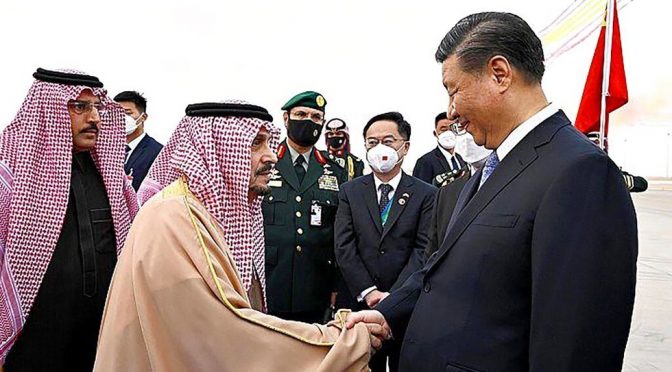Xi Jinping’s visit to Saudi Arabia signals a desire by Arab nations to hedge their bets with stronger partnerships beyond the US.
Chinese leader Xi Jinping has undertaken an official visit to the kingdom of Saudi Arabia. Here, he is set to attend a number of summits including a China-Saudi Summit, an unprecedented China-Arab States Summit and a China-Gulf Cooperation Council (China-GCC) summit. The meetings will involve 14 other heads of states from the region, including Saudi Arabia, the United Arab Emirates, Qatar, Oman, Iraq, Kuwait, Bahrain, and more.
To describe the visit as a “milestone” in China’s relations with the Middle East, as one Arab diplomat apparently did, is accurate. It is a sign of a strategic shift towards a multipolar world. The sides come together in merging a shared set of economic, strategic and security objectives, showing the United States that it cannot dictate to Middle East states who they should and should not have partnerships with.
For most of recent history, the states of the Arab world have been understood to be divided in two groups. On the one hand, there are “clients” of the West, including Saudi Arabia, the United Arab Emirates, Kuwait, Bahrain, Oman and Qatar. On the other hand, there are outright enemies, including Bashar Assad’s Syria and the Iraq of Saddam Hussein.
This is because, in the early 20th century, Western nations designed a Middle East that would supplement their hegemony over itself. Their goal was to create a series of client states who served their interests in terms of access to energy and military, while supressing any revolutionary states that sought to oppose Western dominance in the region.
With this arrangement, the states of the Persian Gulf grew tremendously wealthy through a mutual agreement to provide energy to Western nations in exchange for projecting their military influence across the Middle East. Saudi Arabia has been a critical partner of the United States, while the United Arab Emirates gives air-base access to several Western countries. The West preserves the independence of these countries, while helping them contain revisionist neighbors such as Ba’athist-era Iraq and contemporary Iran.
But the world is changing. The partnership between the West and Arab states is borne out of mutual strategic interests, not ideology or fraternity. They are business partners, not allies, and throughout the past several decades the United States has demonstrated its penchant for causing enormous upheaval, devastation and destruction across the Middle East which has been disadvantageous to all.
While the US may have supported its partners in the Gulf, it has always been an obvious and pressing factor that Washington is only really interested in its own hegemony, and has no true respect for the sovereignty, culture or interests of the countries of the region. What happens, after all, when the world moves away from oil?
Saudi Arabia and similar states may have been tacitly supportive of many things the US has done throughout the Middle East, but we should remember, they are monarchic states based on a conservative rendering of Islam, and do not share the American concept of “human rights.”
Therefore, the rise of China has proven to be critically important for Arab states. Beijing’s emergence as a superpower is prompting countries in the Middle East to diversify their strategic objectives and balance themselves away from a decades-long Western dependency, which can incur many liabilities down the road.
China is different to the United States – not only is it a much larger consumer of oil and gas (because of its population size and sparse resources), but also wields a diplomatic position of non-interference in the internal affairs of other countries and a respect for national sovereignty. For Middle East countries, faced with decades of US-led campaigns and interference around them, this is extremely valuable.
As a result, as the geopolitical picture of the world has turned towards multipolarity and competition between the US, China and others, Arab countries have embraced China as a new benefactor which can bring substantial economic, diplomatic, and strategic benefits over the previous arrangements they had.
While this does not signify “hostility” to the West, and we should expect Arab countries to keep dealing with their current partners, it nonetheless signals a move away from Western dominance over the region and a belief that “the best of both worlds” is ultimately better. The US previously sought to impose many demands regarding China on Arab countries, such as trying to coerce the UAE to ban Huawei from its 5G networks. Abu Dhabi told Washington where to go.
Beyond the China matter, the issue of the Russia-Ukraine conflict has also been a growing sore point between the US and Arab states, especially on the issue of oil production. The common theme between both instances? The US believed it could force its unilateral will on Arab countries, only to be rebuffed.
The China-Arab summits thus reflect the shift in mood – the Arab states are ready to diversify and expand their partnerships to entrench their positions, so that countries such as America may ultimately be forced to accept them as equals.
The Arab states were only ever partners, not allies to the US, and had no fundamental loyalty beyond the factor of who could provide their states with the most benefits, turning a blind eye to decades of US-led wars and destruction across the region.
Now, the rise of China has signaled a new source of wealth, opportunity, and security for the Arab World, leading them to hedge their bets.


